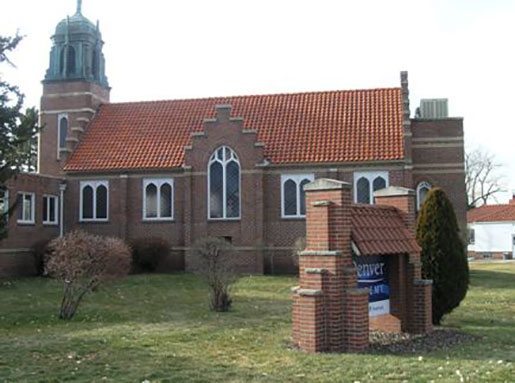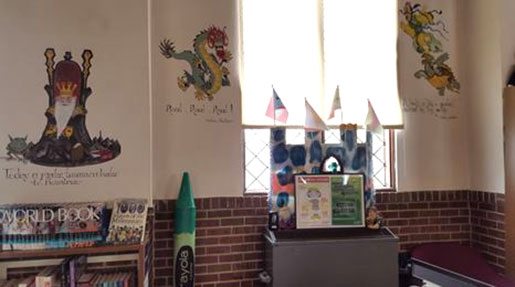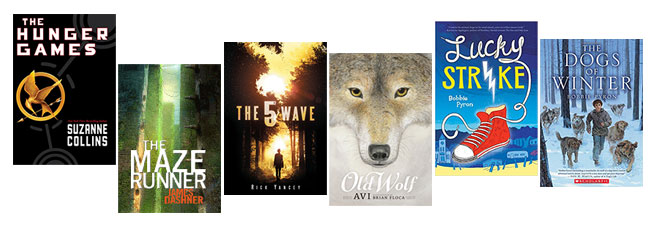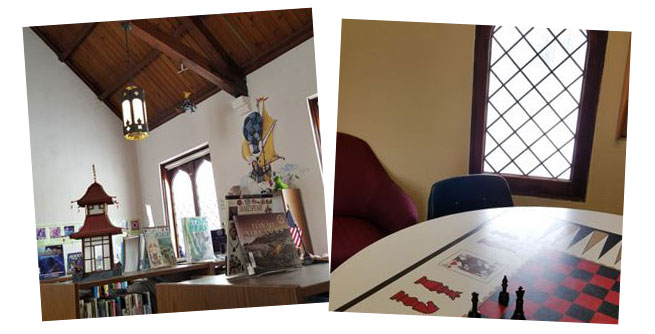The books that most delight middle school and junior high readers often straddle a “Middle Kingdom” ranging from upper middle grade to YA. Each month, Bookology columnist Lisa Bullard will visit the Middle Kingdom by viewing it through the eyes of a teacher or librarian. Bookology is delighted to celebrate the work of these educators who have built vital book encampments in the transitional territory of early adolescence.
This month we’re visiting Denver Academy in Denver, Colorado, where Lisa talks with librarian Jolene Gutiérrez.
Lisa: What are three to five things our blog readers should know about your community, school, or library/media center?
 Jolene: I’m the librarian at Denver Academy, a school for diverse learners from elementary through high school.
Jolene: I’m the librarian at Denver Academy, a school for diverse learners from elementary through high school.
- Our school is located on 22 acres and we use the campus as a learning tool, from studying wildlife in our small pond to working out math problems in chalk on our sidewalks.
- Our campus started as a tuberculosis hospital in the early 1900s, so we have some beautiful historic buildings, including the Chapel where my main library is housed (I also run a small High School Media Center in another building). The Chapel is 90 years old this year and is designated as an historic landmark in the city of Denver. We’re working on a grant application that will help us to preserve and restore certain parts of the building, including the copper cupola and the zinc-camed windows. I’ve done a lot of research over the past few years and have pulled that information together into a website that my students use to create presentations and tours of the Chapel for their parents.

- Our school is comprised of diverse learners, which can mean lots of things. Some of our students are diagnosed with things like dyslexia or ADHD, and some have no diagnoses but do better with smaller class sizes. Either way, many of our students have struggled before coming to Denver Academy, and I think that their struggles and some of the pain they’ve experienced make them some of the most compassionate, respectful kids I’ve ever met. There’s very little bullying on our campus because most of the students know the pain of being bullied or feeling “less than,” and they don’t want others to feel that way.
- Our students are some of the most creative people I’ve ever met. All of our students are brilliant, and that brilliance includes phenomenal artists, gifted musicians, creative writers, and wonderful actors. Many of our alumni have gone on to make a living as actors, sculptors, and musicians.
- Some people say our library and other parts of our campus are haunted. A group of our teachers lead a “Haunted Denver” class each year, and the ambiance of our Chapel library coupled with those ghost tales have inspired many student movies and stories.

Lisa: What recent changes or new elements are affecting the work you do with students?
Jolene: I started working in my library over 20 years ago when we weren’t automated and I was writing out overdue notices by hand. The technological changes in the last 20 years have transformed both the way I manage my library and the skills my students need to have when they graduate from our school. I do my best to keep up with teaching them what they need to know today as well as giving them the critical thinking skills they’ll need in the future (because I have no idea where we’ll be in another 20 years)!
Lisa: What five books (or series) are checked out most often by your middle school students?
Jolene: Dystopian fiction (especially that which has been made into movies like The Hunger Games, The Maze Runner, and The 5th Wave) has been very popular this year, as have books by authors who’ve visited our school recently, including Avi’s Old Wolf and Bobbie Pyron’s books Lucky Strike and The Dogs of Winter. And I know that’s six books, but I became a librarian because I like words better than numbers.

Lisa: What book(s) do you personally love to place into middle school students’ hands?
Jolene: No specific titles; just the right book for each kid, including books that students love because they make the task of reading a little easier to tackle:
- Graphic novels are great for kids who have a tough time visualizing as they read because the pictures are pre-supplied. I also suggest graphic novels for the students who always ask for the novelizations of movies or books that movies are based on — these students may have issues with visualizing and picturing things and might want to read about something that they’ve seen visually, like a movie. Movies are CliffsNotes for kids who struggle with visualization, and they often want to read something they’ve already seen because they now have the images that go with the story.
- Choose Your Own Adventure and similar books are wonderful for reluctant readers because they get to feel like they’re cheating at reading (so are graphic novels and nonfiction books with lots of photos). Now that there are so many CYOA-ish book series out there, students can find both nonfiction and fiction books, and when I show students that they can skip around and not really read the entire book, they get really excited and a lot of them actually end up reading most of the book because they try to get a positive ending to their story.
- Series books give anxious students the answer to “What do I read next?” and help them to grow as a reader as they work their way through each book in the series.
- Audio books and/or large print books allow students who struggle with print other options for accessing books. If students have a learning difference, they can work on growing their reading and comprehension skills in a less intimidating manner with these resources.
Lisa: If you had a new staffer starting tomorrow, what piece of advice would you be sure to give them?
Jolene: Some of our students don’t love books or reading, and that’s okay. We’re here to help them at least learn to like libraries and trust librarians. Teaching students to access libraries teaches them a life skill. And once students begin to trust you, they may become more open to exploring books with you. There’s nothing more fulfilling than finding the right book for a reluctant reader. Oftentimes, there is that one magical book that will unlock the world of reading for kids, and that is one of the most rewarding parts of being a librarian. If you can find that perfect book, you can help change a life forever.

Lisa: What do you want your students to remember about your library in ten years?
Jolene: I want them to remember the magic of this space and the fun we’ve had here! I hope our library teaches students the joy of learning and books. I want our library to provide some warm fuzzy memories for students once they’re grown, and I hope my students’ good memories of their library will cause them to be lifelong library users.

Great interview! I love the sensitivity toward students who don’t love books and reading, as well as the suggestion of graphic novels for students who ask for the novelizations of movies or the books upon which movies are based. Thanks, Jolene and Lisa!
Thanks so much for your comment and for taking the time to read the interview, Catherine! 🙂